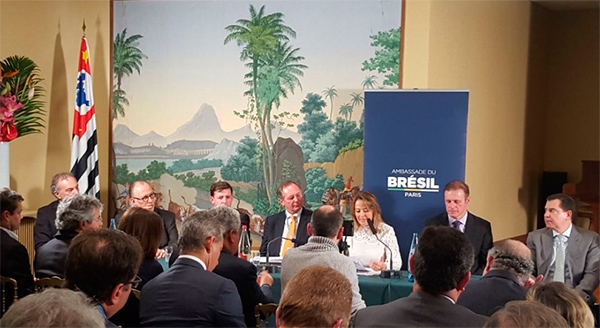

São Paulo State Environment Secretary Patricia Iglecias with representatives of more than 60 business and other organizations at a COP21 side event (photo: Elton Alisson/Agência FAPESP)
More than 60 firms and organizations have signed the voluntary pact, which was launched in Paris as a side event to the UN Climate Change Conference.
More than 60 firms and organizations have signed the voluntary pact, which was launched in Paris as a side event to the UN Climate Change Conference.

São Paulo State Environment Secretary Patricia Iglecias with representatives of more than 60 business and other organizations at a COP21 side event (photo: Elton Alisson/Agência FAPESP)
By Elton Alisson in Paris | Agência FAPESP – The São Paulo State Department of the Environment announced a Climate Protocol for the state on December 8, at a side event held at the Brazilian Embassy in Paris in parallel with the United Nations Climate Change Conference (COP21).
The aim of the Climate Protocol is to encourage firms and other organizations established in São Paulo State to take action to mitigate climate change and adapt to its consequences. The recommended measures range from initiatives to reduce greenhouse gas emissions and use water and energy more efficiently to socio-environmental responsibility practices, all within the framework of São Paulo State’s Climate Change Policy (PEMC).
More than 60 business groups and other organizations have signed the Climate Protocol, a voluntary pact. They include Carrefour, Natura, the Votorantim Group, Dow Chemical, and the São Paulo Association of Supermarkets (APAS).
“The Protocol will enable the state government to identify the companies and organizations that are leading the way in climate change mitigation and adaptation and can set an example for others,” said São Paulo State Environment Secretary Patricia Iglecias during the event.
According to Iglecias, São Paulo’s Climate Protocol was presented to UN Secretary-General Ban Ki-moon on December 4 during the Climate Summit for Local Leaders, another COP21 side event This event brought together hundreds of representatives of cities, states and regions to discuss ways to mitigate and adapt to climate change at the subnational government level.
“Goiás State, Rio de Janeiro State and the Federal District (Brasília) want to emulate São Paulo’s initiative,” Iglecias said.
“We expect other states to establish similar protocols. Fostering the involvement of subnational governments and engaging with the business sector and civil society are crucial if we’re to implement the mitigation and adaptation measures now being discussed by national governments at COP21,” she said.
During the international launch event, 28 companies and organizations that have signed São Paulo’s Climate Protocol presented examples of measures taken to cut greenhouse gas (GHG) emissions, as well as socio-environmental practices that have been implemented in recent years.
For example, Natura achieved its 2013 target of a 33.2% reduction in GHG emissions by using more ecofriendly product packaging, among other measures.
“In fact, we cut GHG emissions by 41% in the production of one of our main product lines simply by replacing the existing pack with a kit that includes a refill,” said Keyvan Macedo, the cosmetics manufacturer’s sustainability manager.
Carrefour introduced a program of smart logistics to reduce pollution by cutting 450,000 km out of its shipping footprint from distribution centers to outlets. The supermarket chain is targeting 40% and 70% reductions in GHG emissions by 2015 and 2040, respectively. Dow Chemical has a plan to cut GHG emissions at the Rio Olympics in 2016, according to representatives of the company.
“São Paulo produces high value-added goods and services and stands to gain a considerable competitive advantage if it produces more efficiently and less carbon intensively,” Iglecias said. “The transition to an economy that meets these needs can and should be driven by public-private partnerships.”
Memorandum of Understanding signed with R20
Another highlight of the Paris event was the signing of a Memorandum of Understanding between the São Paulo State Department of the Environment, the Brazilian Biodiversity Fund (FUNBIO) and the R20 Regions of Climate Action, a non-profit organization founded in 2010 by Arnold Schwarzenegger, Hollywood actor and former governor of California, to promote a low-carbon economy.
The Memorandum of Understanding aims to raise US$50 million for the Riparian Forest Program (known locally as Nascentes), which restores and protects São Paulo’s watersheds.
A socio-environmental best-practice protocol for the financial services industry was also launched at the event, in partnership with the Brazilian Federation of Banks (FEBRABAN). The pact will regulate the Central Bank’s directives for the internal socio-environmental policies of financial institutions operating in São Paulo State.
“This protocol began as a socio-environmental responsibility proposal developed by FEBRABAN and federal public prosecutors in partnership with my department,” Iglecias said.
The event also featured the launch of São Paulo’s Climate Fund by Iglecias. Its goal is to raise money for investment in retrofits for the state’s public buildings to make them more energy-efficient.
“We want this to bring about a change in the energy mix for public buildings in São Paulo State,” Iglecias said. “We believe the public sector must also contribute to climate change mitigation and adaptation.”
Other participants in the event included Paulo César de Oliveira Campos, Brazil’s Ambassador to France; Carlos Klink, Secretary for Climate Change and Environmental Quality at the Environment Ministry; Congressmen Ricardo Tripoli and Orlando Morando; and representatives of NGOs, São Paulo State government agencies, and Brazilian and French entities and associations.
Republish
The Agency FAPESP licenses news via Creative Commons (CC-BY-NC-ND) so that they can be republished free of charge and in a simple way by other digital or printed vehicles. Agência FAPESP must be credited as the source of the content being republished and the name of the reporter (if any) must be attributed. Using the HMTL button below allows compliance with these rules, detailed in Digital Republishing Policy FAPESP.





